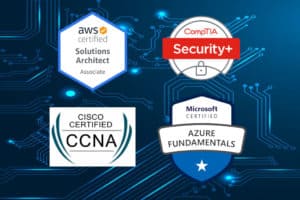Diving into the renewable energy sector feels a bit like deciding to finally hit that trendy fusion restaurant downtown. You’ve heard the buzz, you’re excited about the flavors, but when you open the menu, you’re suddenly swamped with options. Is it going to be the solar-powered sushi or the wind-driven tacos tonight? Likewise, stepping into the ever-evolving world of renewable energy certifications presents a similar conundrum – but with a tad more at stake than your dinner plans.
In this blog post, we’re going to cut through the jargon and serve you the prime cuts of what you need to know about renewable energy certifications in the trade industries. No fluff, just the essentials.
Quick Takeaways:
- Align your renewable energy certification choice with what excites you most and market demands for a fulfilling career path.
- Dive deep into prerequisites and the reputation of certifying bodies like NABCEP for solar energy to ensure your effort pays off.
- Leverage continuous learning and social networks to stay ahead in the renewable energy sector, paving the way for innovation and impact.
What Are Renewable Energy Certifications?
Renewable energy certifications are like golden tickets in today’s eco-conscious world. They validate your expertise within the renewable energy sector, ranging from solar and wind to bioenergy. These certifications aren’t just a pat on the back; they’re a testament to your dedication to both personal advancement and environmental stewardship. They show you’re not just in it for the paycheck but also for making a difference.
Why do these certifications matter so much? Well, they bridge the gap between conventional energy know-how and the innovative, sustainable solutions that our planet desperately needs. They equip trade professionals with the necessary skills to implement and manage renewable energy projects effectively. Plus, they open doors to new opportunities, enabling you to lead the charge in the green energy revolution.
Why Should You Consider Getting Certified?
In a nutshell, renewable energy certifications can turbocharge your career. The demand for skilled professionals in this field is skyrocketing due to global efforts to combat climate change. Certifications can set you apart in a crowded job market, potentially bumping up your salary and proving your credibility and expertise to employers and clients alike.
But it’s not just about the financial perks or the bragging rights. By getting certified, you’re becoming part of the solution to one of the most critical challenges of our time: climate change. You’ll be on the front lines, using your skills to carve out a more sustainable future. Plus, as renewable energy technologies evolve, continuous learning through certification ensures you stay ahead of the curve, making you an invaluable asset in any trade industry.
How Do You Choose the Right Certification?
Choosing the right renewable energy certification might seem daunting, but it’s all about aligning your career goals with current market demands. Here’s a step-by-step guide to making that decision a little easier:
Assess Your Interests and Skills : Are you fascinated by the elegance of wind turbines or the sheer brilliance of solar panels? Start by identifying what aspect of renewable energy sparks your passion.
Research Current Market Trends : Look into which renewable energy sources are experiencing the most growth in your region or globally. For instance, the solar industry has been booming, suggesting a strong demand for solar energy certification.
Consider Specialty Areas : Within each renewable energy sector, there are niches. For solar, specialties might include photovoltaic (PV) installation, solar thermal systems, or grid-connected systems. Find a niche that matches your interests.
Look at Certification Requirements : Each certification has its own set of prerequisites. Some might require prior experience in the field, while others are more entry-level. Ensure you meet these requirements before diving in.
Evaluate the Certification Body’s Reputation : Not all certifications are created equal. Opt for those offered by well-respected organizations within the renewable energy community. For solar energy, for instance, the North American Board of Certified Energy Practitioners (NABCEP) is highly regarded.
Consider the Certification’s Market Value : Some certifications are more widely recognized and valued by employers than others. Research job postings in your desired field to see which certifications come up most frequently.
A Unique Perspective
Rather than just focusing on the most popular certifications, consider those that offer a unique niche or specialization not many professionals possess. For example, a certification in energy storage systems for solar energy can make you highly sought after, as battery storage becomes increasingly important in making renewable energy more reliable and consistent.
Choosing the right renewable energy certification is about finding the intersection between your passions, market demand, and career aspirations. By following the steps outlined above and keeping an eye out for unique opportunities within the space, you’re well on your way to making an informed decision that will propel your career forward in an exciting and meaningful direction.
What Can You Do with a Renewable Energy Certification?
Unlocking a certification in renewable energy is much like finding the key to a treasure chest full of exciting career prospects and opportunities. This burgeoning field isn’t just about making a difference on the environmental front; it’s also about carving out a lucrative and fulfilling career path that can take you places you might not have imagined before.
Dive into Diverse Roles
With a renewable energy certification in hand, you’re no longer confined to traditional jobs. You can swim in a vast ocean of possibilities:
- Solar Panel Technician: Being on the frontline of installing and maintaining solar panels. It’s hands-on and immensely satisfying to see your work harness the sun’s power.
- Wind Turbine Technician: If you’re not afraid of heights and are fascinated by wind power, this is for you. It’s a job that combines mechanical skills with the thrill of working on towering structures.
- Renewable Energy Consultant: Prefer to strategize and advise? Consultants assess energy needs and suggest renewable solutions to businesses and homeowners alike, making a direct impact on sustainability goals.
- Energy Efficiency Analyst: This role focuses on crunching numbers and implementing practices that reduce energy use and cost, a critical aspect of transitioning to renewable resources.
Pave Your Own Path
The entrepreneurial spirit finds fertile ground in the renewable energy sector. Start your own solar installation business, create a consultancy that helps businesses reduce carbon footprints, or innovate with a new renewable energy product. Your certification is the first ripple that can create waves of change.
Embarking on the journey to earning a renewable energy certification might seem daunting at first glance, but breaking it down into manageable steps makes it an exciting adventure rather than an insurmountable challenge.
Choose Your Certification Wisely : First things first, identify which certification aligns with your career ambitions. Are you drawn to solar energy? Or perhaps wind or bioenergy sparks your interest? Each area has its specific certifications, like the NABCEP PV Installation Professional for solar technicians.
Get the Prerequisites Under Your Belt : Some certifications require you to have a certain level of education or hands-on experience. Ensure you meet these requirements before you dive in. This might mean taking some courses or getting practical experience in the field.
Hit the Books : Study, study, and study some more. Use resources provided by the certifying body, enroll in preparatory courses, and join study groups. Don’t skimp on this part – it’s the backbone of your success.
Balance Your Commitments : Juggling work, study, and personal life is no small feat. Create a study schedule that aligns with your life. Remember, it’s a marathon, not a sprint. Break your study segments into manageable chunks and ensure you’re giving yourself time to recharge.
Ace the Exam : Approach the examination with confidence. By now, you’ve prepared as much as you can. Trust in your hard work and knowledge.
Stay Certified : Don’t forget; most certifications require renewal. Stay up to date with the latest in renewable energy and meet any continuing education requirements.
A Unique Tip Most Miss
Embrace Social Learning : In the digital age, traditional studying isn’t the only way to prepare. Engage in online forums, follow thought leaders in renewable energy on social media, and participate in webinars. This not only aids in your study but also keeps you abreast of industry trends and networking opportunities – a gem often overlooked by many.
Earning a renewable energy certification opens doors to a world of innovation, satisfaction, and impact. Whether you’re looking to climb the corporate ladder, start your own business, or simply make a positive difference in the world, the journey begins with a single step. Take it with confidence, and let your passion for renewable energy guide you to a brighter, greener future.





![When to Ask for a Raise and How Much to Ask For? [Guide] planning budget writing expenses in notebook](https://howmonk.com/wp-content/uploads/2022/04/planning-budget-writing-expenses-in-notebook-300x200.jpg)
![How Long to Wait Before Accepting a Job Offer? [Full Guide] person speaking on smartphone while looking at paper](https://howmonk.com/wp-content/uploads/2022/04/person-speaking-on-smartphone-with-paper-300x200.jpg)

